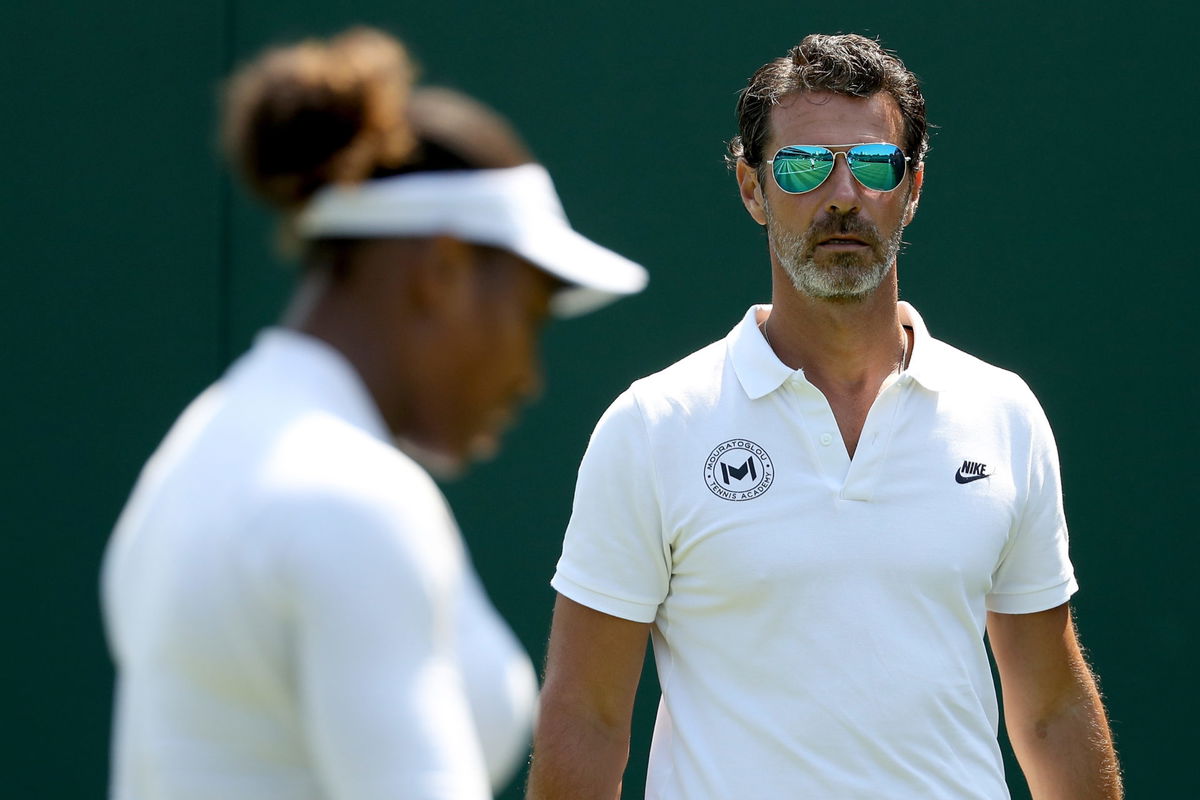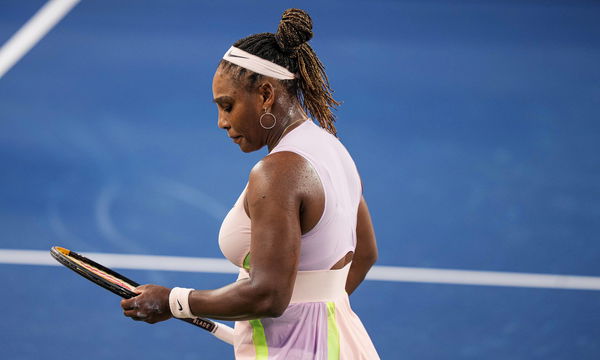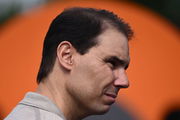
Getty
LONDON, ENGLAND – JUNE 28: Coach Patrick Mouratoglou watches as Serena Williams of the United States practices on court during training for the Wimbledon Lawn Tennis Championships at the All England Lawn Tennis and Croquet Club at Wimbledon on June 28, 2018 in London, England. (Photo by Matthew Stockman/Getty Images)

Getty
LONDON, ENGLAND – JUNE 28: Coach Patrick Mouratoglou watches as Serena Williams of the United States practices on court during training for the Wimbledon Lawn Tennis Championships at the All England Lawn Tennis and Croquet Club at Wimbledon on June 28, 2018 in London, England. (Photo by Matthew Stockman/Getty Images)
In a 2018 Teen Vogue interview, Serena Williams revealed the body shaming she faced throughout her career, saying, “People would say I was born a guy, all because of my arms, or because I’m strong.” Fast forward to now, and the conversation has taken a new turn. When Williams appeared in a People magazine feature discussing her 31lb weight loss, the story felt more like a polished commercial. The focus wasn’t just on her transformed physique, but on Ro, a telehealth service offering GLP-1 weight-loss drugs, where her husband Alexis Ohanian sits on the board, reigniting talk of her weight struggles and clashes with ex-coach Patrick Mouratoglou.
Watch What’s Trending Now!
Serena Williams’ journey has never been ordinary, and neither has the conversation around her body. Recently, the 23-time Grand Slam champion has been on a US media blitz, promoting a weight-loss drug and sparking debates about whether it undercuts her athletic achievements and the values of hard work, diet, and training.
In a recent interview, Williams revealed that criticism about her weight factored into her decision to seek a medical route to weight loss. And her former coach, Patrick Mouratoglou, is not shying away from sharing his perspective on the matter.
ADVERTISEMENT
“Oh I remember it very well,” the Frenchman said, reflecting on those moments with striking clarity. “It was after the pregnancy – not right after; I know these things take time. I told her: ‘Listen, this is not a comment on how you look. It’s not my problem.’ But tennis is a sport in which you can’t afford to be overweight. First of all, the pressure on your joints and everything is so big that your chances become much higher.”

Imago
Syndication: The Enquirer Serena Williams faced Emma Raducanu during the Western & Southern Open at the Lindner Family Tennis Center in Mason Tuesday, August 16, 2022 in one of her last tournaments before she retires. Williams lost 4-6, 0-6. Tuesday Serena16 Cincinnati OH , EDITORIAL USE ONLY PUBLICATIONxINxGERxSUIxAUTxONLY Copyright: xCaraxOwsley/ThexEnquirerx 18879973
His words didn’t stop there. Mouratoglou went on to stress the science behind his concerns. “The second thing is it’s a sport in which you change directions all the time and with a lot of speed. Even one kilo overweight is a lot. When you go full speed in one direction with one kilo extra and then need to stop and come back, the time that you lose is really important. Just look at the best players in the world – Alcaraz, Sinner, Djokovic. Think about their movement. The weight was affecting her movement.”
ADVERTISEMENT
The discussion, however, wasn’t just tactical; it was personal. “In Serena’s case, she was older – so of course the body is not going to bounce back the same as before, and the risk of injury is even bigger. We had a few fights about it. I remember she did not like when I said that because she thought I was judging her,” Mouratoglou admitted, underlining the emotional weight that came with his honesty.
But Mouratoglou remained firm in his stance, putting tennis above everything else. “I kept telling her, I don’t care about your look. It’s not my job. My job is your tennis. If you want to come back to the top and make history, then we have to be very efficient on every level – including this one, which for me was the key element.” His words may have stung, but they reflected a deep commitment to helping Serena reach the highest level again.
ADVERTISEMENT
Williams’ struggles with body image began with postpartum changes after giving birth to her first daughter, Olympia, in 2017, and resurfaced after her second daughter, Adira, was born in August 2023. She admitted to losing “a lot” of weight in the two weeks after River’s birth but said she “never lost another pound” after that, highlighting the long battle she faced to regain peak physical form.
Today, Williams is rewriting the narrative. In an interview on NBC and through a press release, she explained that her partnership with Ro was about more than herself; it was about helping others. “I’m partnering with Ro because if I needed help as a top athlete doing everything at level 10, I know others are struggling too, and everyone deserves access to the treatment they need,” she said.
GLP-1 medications, commonly used to manage blood sugar in diabetics, are also prescribed for weight loss. Struggling with post-pregnancy weight, Serena Williams decided to try one. “After giving birth to Olympia, the weight just did not come off. I was back on the court, in the gym, and I wasn’t clean every single day without a little bit changes to my body and it was really so frustrating to see the skin always the same every single day. I made a choice to go on a GLP-1, and I am doing it,” Williams explained.
ADVERTISEMENT
In doing so, Serena has flipped the script, turning what was once a point of contention into a movement, using her platform to shed light on body image, health, and the choices women make to stay strong in every sense of the word.
Patrick Mouratoglou shares how Serena Williams changed everything
Recently, in an exclusive with EssentiallySports, Patrick Mouratoglou reflected on his journey with Serena Williams, a partnership that defined an era of tennis greatness. Their bond was tested after Serena’s daughter Olympia was born in September 2017. “The results were not good. She played four Grand Slam finals and lost all four, which was very unusual,” he admitted. The weight of chasing the all-time record and the mental toll of motherhood were immense. “Her daughter was taking a lot of space in her mind… we never found a solution for her to win more,” he confessed.
ADVERTISEMENT
Even with doubts clouding her comeback, Serena roared back in 2018, reaching Wimbledon and US Open finals, proving her fire still burned fierce. Yet, the elusive 24th Grand Slam continued to slip from her grasp. Mouratoglou revealed, “At a point, I said to her, ‘Maybe I’m not… maybe it’s time for a change. It’s the end of your career. You need to make that extra Grand Slam, and it’s clearly not working… maybe someone else will do it better than me.’”
But Serena was never one to back down. According to Mouratoglou, she shot back, “You can’t say that! We are the best team, we’ve always been. You can’t think like that!”
Top Stories
Rafael Nadal Sets Boundary With Reporter During Australia Exit as Security Steps In

Carlos Alcaraz Withdraws From Next Tournament Just After Winning the Australian Open

Naomi Osaka, Jessica Pegula & Other Top Stars Add to Qatar Open Withdrawals as Concerns Mount

ATP Player Sparks Confusion With Bizarre On-Court Display at Challenger Event

Giovanni Mpetshi Perricard Forced to Retire After Bizarre Self-Inflicted Incident Mid-Match in Montpellier

He described that moment as “amazing… I didn’t expect that at all. She always stood by me. That was incredible.” That faith carried her through 319 weeks as WTA World No. 1, with 186 consecutive weeks of dominance from 2013–2016.
ADVERTISEMENT
Now retired and championing health and women’s empowerment, one can only wonder: Will Serena ever grace the court again?
ADVERTISEMENT
ADVERTISEMENT
ADVERTISEMENT
